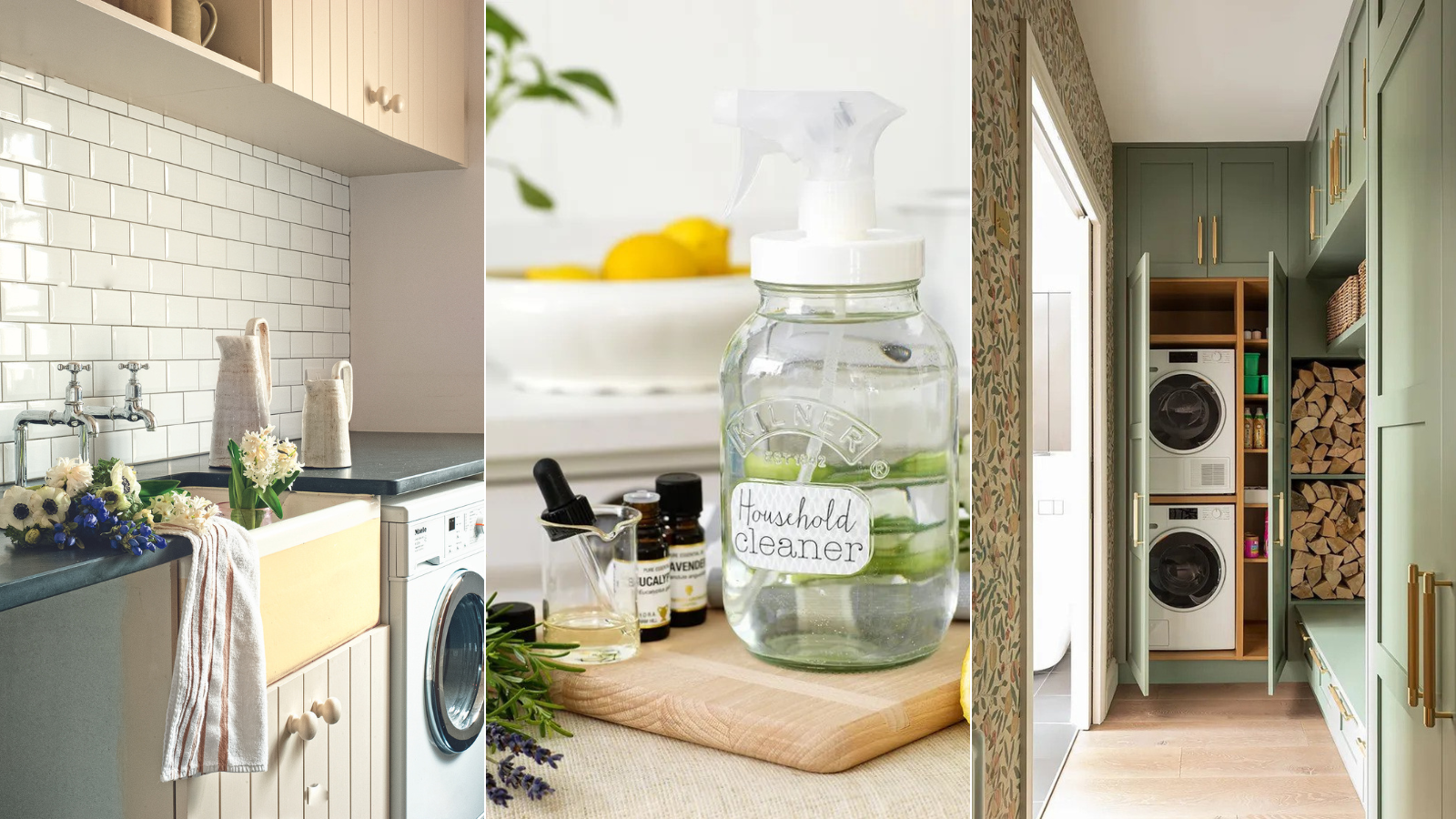Experts explain what enzyme cleaners are and their benefits
Learn what enzyme cleaners are, and how you can incorporate them as part of your cleaning routine


Design expertise in your inbox – from inspiring decorating ideas and beautiful celebrity homes to practical gardening advice and shopping round-ups.
You are now subscribed
Your newsletter sign-up was successful
Want to add more newsletters?

Twice a week
Homes&Gardens
The ultimate interior design resource from the world's leading experts - discover inspiring decorating ideas, color scheming know-how, garden inspiration and shopping expertise.

Once a week
In The Loop from Next In Design
Members of the Next in Design Circle will receive In the Loop, our weekly email filled with trade news, names to know and spotlight moments. Together we’re building a brighter design future.

Twice a week
Cucina
Whether you’re passionate about hosting exquisite dinners, experimenting with culinary trends, or perfecting your kitchen's design with timeless elegance and innovative functionality, this newsletter is here to inspire
An enzyme cleaner is a type of natural cleaning product that harnesses the power of natural enzymes to break down and eliminate stains, odors, and organic matter. They speed up the cleaning process by targeting organic matter and breaking down these substances into smaller bits, making it easier to wipe away the mess and leave your space fresh and clean.
Enzyme cleaners work by accelerating the natural biodegradation process. They contain specific enzymes designed to break down certain types of organic matter, such as proteins, starches, or fats. Once the enzymes break down this material, they essentially eat it away, fully removing it from the surface.
Enzyme cleaners are the unsung heroes of the cleaning industry. They offer a powerful and eco-friendly solution to many common cleaning problems, similar to tea tree oil and lemon juice.
What is an enzyme cleaner?
Enzyme cleaners offer several benefits that make them an attractive choice for many households:
1. Effective stain and odor removal:
Enzyme cleaners excel at tackling a variety of tough stains and odors, making them versatile for home cleaning, says Karina Toner, operations manager at Spekless Cleaning. ‘They are particularly effective on organic stains like food, pet accidents, and bodily fluids.’
The enzymes break down the organic matter at a molecular level, eliminating the source of the stain or odor.
Pet accidents: Enzyme cleaners are highly effective in neutralizing and eliminating the odor and stains associated with pet urine, vomit, and feces.
Design expertise in your inbox – from inspiring decorating ideas and beautiful celebrity homes to practical gardening advice and shopping round-ups.
Food stains: Whether it's spilled wine, coffee, or sauce, enzyme cleaners can target the organic components of food stains, leaving surfaces clean and odor-free.
Laundry: Enzyme cleaners are useful additives in laundry to break down stains and odors on clothing and linens.

Karina Toner is a cleaning expert at Spekless Cleaning, a house cleaning service based in Arlington or Washington D.C.
2. Environmentally friendly
According to Parveen Garg, manager at Ola Clean, enzyme cleaners are typically formulated with biodegradable ingredients and are non-toxic, making them safer for both your family and the environment. They are a greener alternative to harsh chemicals commonly found in traditional cleaning products.
Different plant enzymes accomplish different things. Protease enzymes are great at breaking down protein-based stains like food residues. Amylase enzymes specialize in digesting carbohydrates, so they're effective against starches found in things like pasta or cereal. Lipase enzymes focus on fats and oils, making them excellent for greasy stains in the kitchen.
Unlike acidic solutions inclusive of vinegar or bleach, which crumble waste, enzyme cleaners function via penetrating cracks, crevices, and fibers to take away stains and odors without the usage of harsh detergents or caustic chemical compounds.
Puracy Natural Stain Remover from Amazon, as an example, makes use of six plant-based total enzymes to remove smudges, spots, and imperfections from water-safe substances. It is secure for rugs, sofas, and bedding because it does not bleach, fade colors, or smash materials.

Parveen Garg is the Manager at Ola Clean, a successful cleaning services business. With 4 years of experience, he possesses a deep understanding of the industry and excels at leading teams to deliver outstanding results.
3. Versatile and safe for various surfaces
Enzyme cleaners are generally safe to use on a wide range of surfaces, including carpets, upholstery, fabrics, and hard surfaces. This versatility makes them a convenient choice for different cleaning needs around the house.
However, according to Shayne Jeramos, cleaning specialist at Bright Cleaners, it's important to note that different enzyme cleaners are designed for different types of organic matter. Therefore, it's crucial to choose the right type of enzyme cleaner for the job at hand.

Shayne Jeramos has been a cleaning specialist at Bright Cleaners for over 2 years and has extensive experience with residential and cleaning services.
Limitations of enzyme cleaners
While enzyme cleaners offer numerous benefits, it's important to consider their limitations:
1. Limited effectiveness on certain types of stains
Enzyme cleaners are most effective on organic stains and odors. However, they may have limited effectiveness on certain types of stains, such as those caused by inorganic substances like oil or metal.
‘High temperatures can also deactivate enzymes,’ says cleaning expert Prerna Jain. ‘When using enzyme cleaners on laundry, avoid using hot water, as warm or cold water is often more effective.’
For a more heavy-duty oil cleaner try the Oil Eater Original Cleaner from Amazon. This biodegradable product has no harsh solvents, is noncorrosive, and extremely efficient at dissolving grease, oil, and dirt from washable surfaces

Prerna Jain is the founder of Ministry Of Cleaning, a top-rated cleaning service with years of industry experience.
2. Potential for allergic reactions
Although enzyme cleaners are generally safe, some individuals may be sensitive or allergic to specific enzymes. The most common type of enzymes which some people may be allergic to are some proteases, which can produce irritating effects in high concentrations if not washed off correctly.
It's always advisable to read product labels and test a small, inconspicuous area before applying the cleaner to larger surfaces.
FAQs
Can you make your own enzyme cleaner?
You can easily make your own enzyme at home with household items. Use a mixture of citrus peels to form the base of your homemade enzyme cleaner, including oranges, lemons, limes, and grapefruits. It's important to note that you need to use fresh citrus peels and dried peels do not contain enough citrus oil for cleaning and rotten peels will make the mixture turn moldy.
Enzyme cleaners offer a powerful and eco-friendly solution for removing organic stains and odors around your home. Their effectiveness, safety, and versatility make them a popular choice for many households. By harnessing the power of enzymes, these cleaners provide an alternative that is both effective and environmentally conscious.

Seraphina is a contributing editor at Homes & Gardens, writing Solved features on organizing and storage. She loves to decorate and also grow her own produce from her home in London. Her previous experience includes working at Women's Health and Fabulous Magazine.